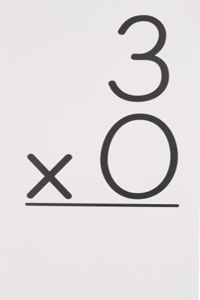Zero's Strange Properties
That zero manages to be both a non-negative and non-positive integer yet is neither negative nor positive is just one of the unique properties of the number. In fact, there is a group of these strange characteristics called the properties of zero.
The addition property of zero says that if you add or subtract zero from any other number, the answer will always result in the other number. 5+0=5 and 9,000,017-0=9,000,017, for example. It reflects the concept of zero as representing nothing -- so nothing added to something leaves that something unchanged -- zero is the only number that doesn't alter other numbers through addition or subtraction.
Advertisement
The additive inverse property of zero reflects its position as the fulcrum between the negative and positive integers. Any two numbers whose sum is zero are additive inverses of one another. For example, if you add -5 to 5, you arrive at zero. So -5 and 5 are additive inverses of one another.
The multiplication property states what every third-grader knows: Multiplying any number by zero results in a total of zero. It's obvious once ingrained but perhaps the reason is overlooked. Multiplication is, in one effect, a shortcut for addition. 3x2 is the same as 2+2+2, so the idea that a number can be added zero times or that zero can be added to itself any number of times is mathematically senseless [source: Carasco].
The concept of dividing by zero is even more senseless, so much so there is no property for it; the concept simply doesn't exist since it can't be carried out. Even mathematicians often struggle to explain why dividing by zero doesn't work. The reason is essentially related to the multiplication property. When dividing a number by another number, for example 6/2, the result (in this case, 3) can be meaningfully plugged into a formula where the answer multiplied by the divisor equals the dividend. In other words, 6/2=3 and 3x2=6. This doesn't work with zero when we replace 2 with it as the divisor; 3x0=0, not 6 [source: Utah Math]. The concept of dividing by zero is fraught with illogical consequences, so much so that its mythical destructive power has become a joke on the Internet.
There is also the property of the zero exponent; because of the existence of negative exponents, numbers to the negative power, numbers to the zero power always equal one. Although this works mathematically, it too presents logical problems. Chiefly, zero to the zero power still equals one, although zero added or subtracted to or multiplied by itself should equal zero [source: Stapel].
Behold, the power of zero.
Related Articles
- How Math Works
- How Fractals Work
- How Tessellations Work
- Ultimate Fractals Quiz
- Quiz: Tessellate This!
Sources
- Arsham, Hossein. "Zero in four dimensions." University of Baltimore. Accessed April 18, 2011. http://home.ubalt.edu/ntsbarsh/zero/zero.htm
- Ask Dr. Math. "Division by zero." The Math Forum at Drexel University. Accessed April 5, 2011. http://mathforum.org/dr.math/faq/faq.divideby0.html
- Carasco, Jester. "Properties of zero." Basic-Mathematics.com. Accessed April 18, 2011. http://www.basic-mathematics.com/properties-of-zero.html
- Forex Realm. "Fibonacci biography and facts." Accessed April 15, 2010. http://www.forexrealm.com/technical-analysis/fibonacci/fibonacci-biography-history-facts.html
- Gray, Jeremy. "Book review: Zero: the biography of a dangerous idea." Notices of the AMS. October 200. http://www.ams.org/notices/200009/rev-gray.pdf
- Knott, Dr. Ron. "Who was Fibonacci?" University of Surrey. March 11, 1998. http://www.maths.surrey.ac.uk/hosted-sites/R.Knott/Fibonacci/fibBio.html
- Matson, John. "The origin of zero." Scientific American. August 21, 2009. http://www.scientificamerican.com/article.cfm?id=history-of-zero
- O'Connor, J.J. and Robertson, E.F. "The history of zero." University of St. Andrews. November 2000. http://www-history.mcs.st-and.ac.uk/HistTopics/Zero.html
- Pepperberg, Irene and Gordon, Jesse D. "Number comprehension by a grey parrot (Psittacus erithacus), including a zero-like concept." Journal of Comparative Psychology. 2005. http://www.alexfoundation.org/papers/JCPAlexComp.pdf
- Saudi Aramco World. "Zero, key to numbers." November 1961. http://www.saudiaramcoworld.com/issue/196109/zero.key.to.numbers.htm
- Seife, Charles. "Zero: the biography of a dangerous idea." Penguin. 2000. http://books.google.com/books?id=obJ70nxVYFUC
- Singh, Simon. "5 numbers - zero." BBC. March 11, 2002. http://www.bbc.co.uk/radio4/science/5numbers1.shtml
- Stapel, Elizabeth. "Negative exponents." Purplemath. Accessed April 18, 2011. http://www.purplemath.com/modules/exponent2.htm
- Stockton, J.K. "Date miscellany I." March 10, 2010. http://www.merlyn.demon.co.uk/miscdate.htm#AstDat
- Teresi, Dick. "Zero." The Atlantic. July 1997. http://www.theatlantic.com/past/docs/issues/97jul/zero.htm
- The Straight Dope. "Is zero a number?" Accessed April 5, 2011.http://www.straightdope.com/columns/read/1633/is-zero-a-number
- University of Utah Mathematics Department. "Why can't we divide by zero?" February 17, 1997. http://www.math.utah.edu/~pa/math/0by0.html
- Wolfram Math World. "Natural number." Accessed April 5, 2011. http://mathworld.wolfram.com/NaturalNumber.html
